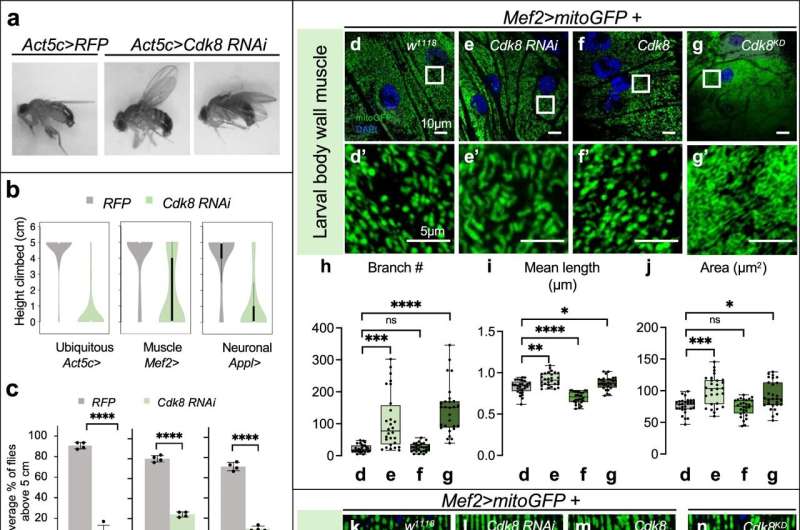This article has been reviewed according to Science X's editorial process and policies. Editors have highlighted the following attributes while ensuring the content's credibility:
fact-checked
peer-reviewed publication
trusted source
proofread
Fruit fly study identifies gene that may reverse Parkinson's disease

Researchers at Simon Fraser University, in collaboration with a group from Baylor College of Medicine in Texas, have identified a gene that appears to reverse Parkinson's disease symptoms in fruit flies.
SFU's Verheyen lab discovered that increasing the amount of the fruit fly Cdk8 gene in flies with Parkinson's causes the disease's symptoms to reverse. The breakthrough was published recently in Nature Communications.
"With familial Parkinsonism, one of the big problems is a gene mutation that causes mitochondria to malfunction, and this can make cells sick or cause them to die," explains Esther Verheyen, SFU professor of molecular biology and biochemistry and corresponding author of the paper. "This contributes to a lot of the cognitive losses and other disease symptoms."
Their research shows that fly Cdk8 and its human counterpart CDK19 have a role in regulating mitochondria, the powerhouses of the cell. Numerous studies have looked at ways to suppress Parkinsonism, but Verheyen's research is the first to identify that particular function for the gene Cdk8 and CDK19.
SFU graduate student Jenny Liao and Hyung-lok Chung, a postdoctoral researcher at Baylor College of Medicine, are the co-lead authors on the paper. Geneticist Hugo Bellen from Baylor College is a co-corresponding author.
"We figured out that fly Cdk8 can bypass a defect found in cells that carry a mutation that causes inherited Parkinson's," says Verheyen. "This function involves helping cells get rid of defective mitochondria, which is a function that is impaired in Parkinsonism. We can do genetic tricks to put more of the fly Cdk8 or human CDK19 gene into cells and we were able to make them healthy again.
"One of the powers of using flies to study human disease is that you can play with adding back good genes and taking away bad ones to find ways of alleviating disease symptoms. It's like solving a puzzle. Since many human disease genes have fly counterparts, we can gain valuable knowledge in flies that can be translated to clinical treatments."
Parkinsonism is an umbrella term that refers to several conditions, including Parkinson's disease, marked by brain conditions that result in slowed movements, stiffness and tremors.
The Verheyen lab uses molecular, genetic and biochemical approaches to understand organismal development and diseases, such as cancer and Parkinson's. Their primary vehicle for such studies is the fruit fly, as almost 75% of human disease genes have counterparts in the fruit fly, enabling the team to take advantage of the genetic tractability to understand protein function in numerous developmental contexts.
"Inside of a fruit fly, their cells look and act very much like our cells. Their cells and organs really function in similar ways, which is kind of hard to wrap your head around when you think of a little fruit fly in a kitchen. But inside their body they have a nervous system, a digestive tract, muscles and many other comparable organs."
Verheyen explains that the fruit flies are manipulated to carry mutations that human patients might have, including mutations implicated in cancer or Parkinson's, and then start teasing apart what is happening at a cellular level: "We regularly put human genes into flies and see how they affect important functions. We can get great insights into what causes diseases in cells and how we might alleviate those."
More information: Jenny Zhe Liao et al, Cdk8/CDK19 promotes mitochondrial fission through Drp1 phosphorylation and can phenotypically suppress pink1 deficiency in Drosophila, Nature Communications (2024). DOI: 10.1038/s41467-024-47623-8


















